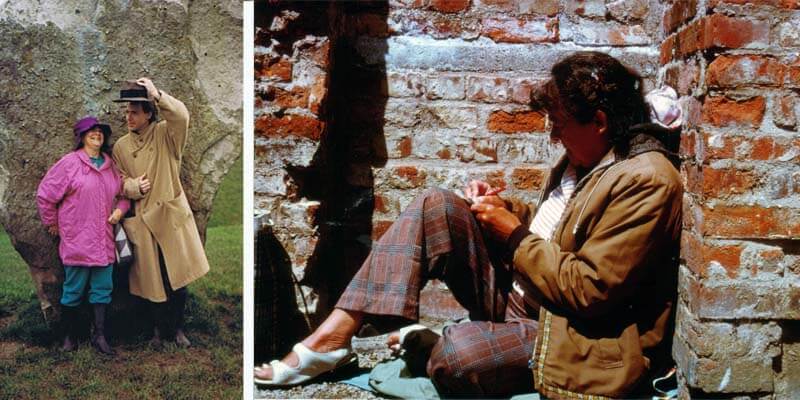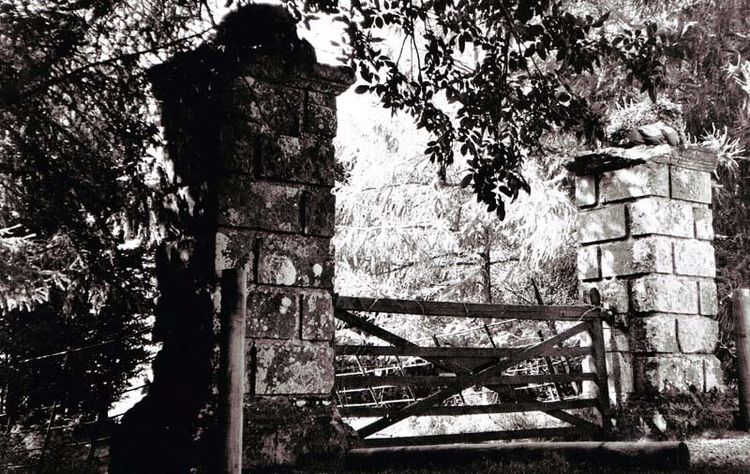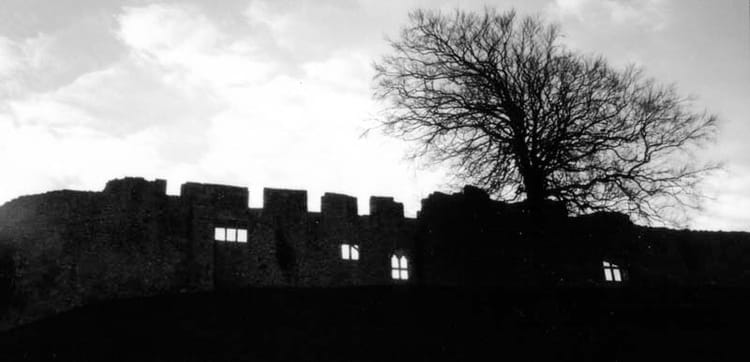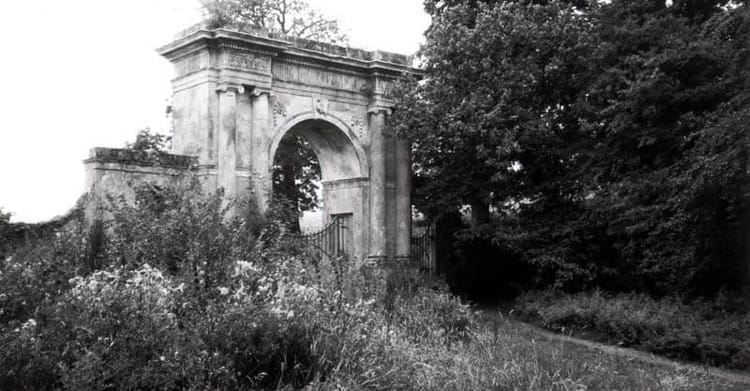HMS Victory. Ghosts of Portsmouth Historic Dockyard, with Margo Williams

French in an English Warship
GATHERED ON THE QUAYSIDE by the Victory, awaiting their tour guide, clustered several parties of French schoolchildren and their teachers.
I have sometimes wondered what the ghosts on board thought of these times when the children come visiting the shrine of the fallen hero who led the Victory against the ships of their forefathers.
There seemed no malice upon the children’s faces, only varieties of boredom, curiosity and excitement.
There is little evidence of the ravages of that great sea battle which made the Victory so famous, when she led the attack and braved the fire-storm of the enemy ships off the coast of Trafalgar in October 1805.
The holes have been plugged, timbers replaced, as were the masts and rigging; in fact only the lower decks remain of the original ship. In restoration she is a majestic sight in her warpaint of black and gold, and bristling with guns.
The French children were led inside by a guide who spoke their language, and some few minutes later we followed with our own tour guide.
The elderly bespectacled man in naval uniform, gathered his flock of visitors before him and led us up the gangplank and into the ship.
Welcome to the Victory
He smiled, confidently and waited patient while all finished their last-minute fidget, then introduced himself and touched his hat. He slapped a low beam, then pointed downward to the lines of polished cannonballs.
“Watch yer ‘eads, and yer step, ladies and gentlemen. Welcome to the Victory.”
Despite its huge size from the outside, the interior of the Victory is warren-like and dark; the ship’s timbers crowd low and threatening, its stepways steep and dangerous. Every few feet stand the huge cannon and arranged around them on the floors are lines of cannonballs.
In the spaces between, above and around are the tools for feeding and firing the now cold beasts of war.
One tourist banged his head as he climbed a stairway; another slipped on a cannonball.
The guide cast a wary, knowing look at each as he waited at the top, then when the last visitor reached the summit, he bent knees and welcomed us to the Captain’s Cabin.
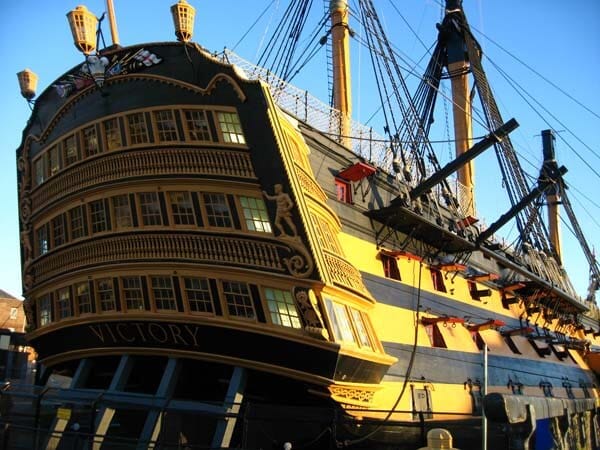
A Ghost in Nelson's Cabin
The cabin is the only place other than the deck with a feel of light and space, for the entire rear wall is window.
Comfortable and spacious; arranged with tasteful pieces of period furniture, chairs and a desk. I sensed a presence; felt it come close beside me.
More glow than cold. As if it too admired the guide's demonstration of the incredible efficiency of a fighting ship. How everything is on hinges to be raised for battle.
“Of course, the furniture was carried in a boat behind,” explained the guide. “Enemy captains would not fire on these.”
I felt the presence shift slightly, the air seemed to shiver. If it was a ghost, there was no time to let it speak as the guide moved on, again with the reminder “Watch yer ‘eads”.
Visitors were led down steps and out onto the deck, where it felt delicious to breathe again fresh air after the polish fumes and mustiness below.
The Victory Deck
Stragglers caught up and joined the semicircle in front of the guide, and all followed his finger that directed attention downward to a small brass plaque laid into the timbers of the decking.
The guide cleared his throat and everyone fell silent.
“Ladies and gentlemen, today it is quiet but try and imagine you’re in the midst of battle. There is smoke and fire. Screaming and explosions...”
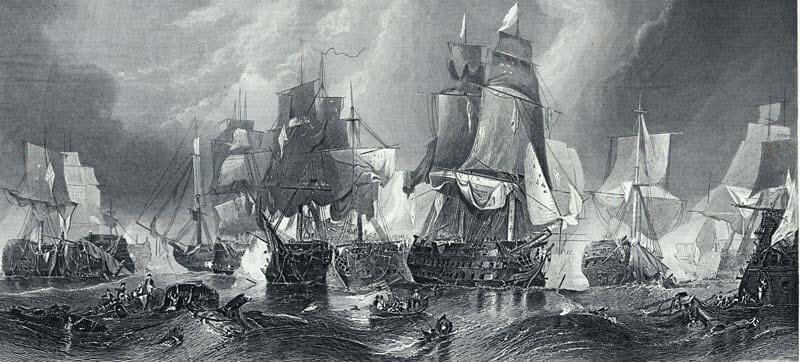
I IMAGINED BOOM BOOM of the guns. Cannonballs crashing through the rigging and the deck awash with bl..d, wood splinters and water. Deafening, air-punching BOOM of the cannon.
The guide assumed an action stance. “Nelson headed straight for the enemy, every sail the masts could bear, for there wasn’t much wind that day.
"He pierced their line and then went looking for Admiral Villeneuve, who led the combined fleets of France and Spain.”
The guide looked around at each visitor in turn, eyes wide.
“It was a storm of fire but Nelson, calm as you please, paced the Quarterdeck in full honours. Then…”
And he waited while the image of Nelson arrived in the mind of all.
“Then the Victory came by the stern of the Bucentaure, opened fire and sent a broadside into the heart of Admiral Villeneuve’s flagship.”
His voice took on a different tone as he raised quivering pointing finger upwards. “See up there?” Everyone looked. “That’s called a Fighting Top.”
We saw a high platform fixed around the masts.
Into the War Storm
“Well, on the other side of the Victory was the Redoubtable, and she crashed into the bow and the two ships were locked together, side by side.”
The Navy-man traced his finger from the Fighting Top downwards to the brass plaque on the deck.
“From up there a musket-man on the Redoubtable had a clear shot at Nelson and fired. The bullet fizzed and took the Admiral in the left chest, then ricocheted down his spine.”
There was silence. The guide gathered himself while all peered at the brass plaque. “There Nelson fell.”
The silence turned reverential for a moment or two before the guide gestured. “If you’ll follow me, ladies and gentlemen, I will take you down below. Mind yer ‘eads,” he added, then slid down the rails into the bowels of the ship.

Belly of the Haunted Warship
I felt the ghostly presence hover close; sensed it wanted to speak but there was no opportunity for I too had to follow the guide.
But felt it accompany me, always close but not heavy. The ghostly presence felt gentle. Deeper and deeper we travelled, each deck’s headspace lower, and its stepways steeper.
The lower gun deck was dark and cramped and smelled not so much of polish, though that was there in plenty; it was another atmosphere, altogether different, something old.
The visitors crouched low as we stumbled through the cannon-filled realm of shadow and lantern-light, and emerged in a small cramped space to find the guide waiting, hat in hand beside a large wooden barrel.
Next to it, illuminated with soft light, stood an easel with an oil painting framed with gold. The picture depicted a nearby rib of the ship against which the dying Nelson lay.
The guide said nothing, and all took the opportunity of marking the silence too.
At last he spoke. “It was here they brought the wounded admiral…” He began to describe an account of the last moments of this hero’s life.
The ghost stood close.
Courage Under Fire
I heard the tour guide explain how on special occasions senior officers in the Royal Navy gather in that strange dark corner of the Victory to pay homage.
Who knows if any of them, as they stood hats off and heads bowed in contemplation, sensed the gentle ghostly presence who undoubtedly joined them on each such solemn occasion?
“...I have followed you madam. I pray you may heed this soul, so well-known yet so unworthy of the attention given,” he said, softly. “I am Thomas Hardy, the man who held Nelson as he died. I fear I may be responsible for this great man’s de.th.
At that time had persuaded him on deck in the height of battle. He had retreated to his cabin to get something, I know not what. I called him to hurry, he did so, and fell. Had he been a moment later he would have escaped this terrible injury that caused him to depart at that time to the next world."
The ghost paused, thoughtful.
"This incident haunted me for the rest of my life. I fear laughter was never heard coming from my mouth. Having been a prisoner in that place where he died, have learnt much. There are mighty ones who decree when a man should die, so my guilt has been in vain; yet could not leave. You madam send me on a voyage unknown, but welcome. Thank you.”
The ghost identified himself by first and surname; easy to confirm.
Thomas Masterman Hardy, famous Flag Captain of the Victory, was appointed First Sea Lord in 1830 before his death in 1839. His final testimony seems to create more controversy than the old famous one of Nelson’s last words “’Tis Kismet, Hardy” or, “Kiss me, Hardy.”
The tour guide watched me as I finished writing the ghost’s message. He seemed a little impatient, but how could I explain what had taken place?
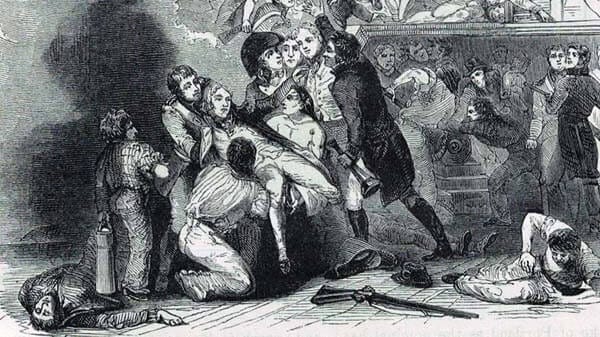
MILITARY COMMENTATORS might wonder over the ghost's surprising admission; that the admiral of the fleet was momentarily below-decks in the maelstrom firestorm that raged across the Victory's decking.
Captains should stand regardless. Courage under fire, and all that.
No one ever believed Nelson suffered any loss of courage, and no one ever said a genius commander should be stupid enough to ignore the war wisdom: "Duck and Cover," or go find a better weapon.
Among the ghosts who shared their thoughts on life and death that day, a mother who brought her child to experience the Victory, and ignored that warning too.
The Ghost of Gladys Parsons
“If you would come this way, madam, we shall find our way out.” Tour guide slapped a low beam and grinned at me.
He turned and I followed him around and down, and up and through and finally out of a hole in the side where the rest of the party stepped carefully down a gangplank to the ground on the other side of the ship.
The tour was over, but something still followed me. Although weary from the contortions and concentration, I felt pleased to find time for the ghost of Gladys Parsons:
“...How many years have I waited, sixty, sixty-five?” she asked. “I do not know. Lost count. Came here with my husband and three-year-old son to look over the Victory. They had warned us the ceilings were low and to mind your head.
The little one was tired and I picked him up and carried him. We went down some steps, at the bottom I ducked to avoid striking my head but failed to lower my son, consequently he banged his head.
Of course everyone fussed around him and a bump soon came up. We left the ship and brought him an ice cream to stop him crying. He developed a bit of a fever but was over it in a couple of days but to my horror he never spoke again. The blow on his head had affected his brain."
She sighed, deep as the ocean.
"He became nearly an imbecile, all because of my carelessness. I never forgave myself. My husband went off with another woman two years later, leaving me with an idiotic son. I have haunted down here in this old ship all these years, believing myself wicked. You show me the way out. I am so grateful. My name is Gladys Parsons and my son was called David.”
Some of my Christian friends say that what I do is wicked, that these spirits are in fact evil demons; part of Satan’s dark army.
Insensitive choice of words, perhaps; but I guessed Mrs Parsons and all the other earthbound would find it an unnecessarily depressing experience to be confronted by a determined priest declaring them evil spirits and casting them down to Hell and damnation.
Thank you for your company on this short tour of life and death mysteries and haunting. If you would like to know more about Margo Williams' investigations in Portsmouth Historic Dockyard and other matters of life and death, read this book. Now available from Amazon.

